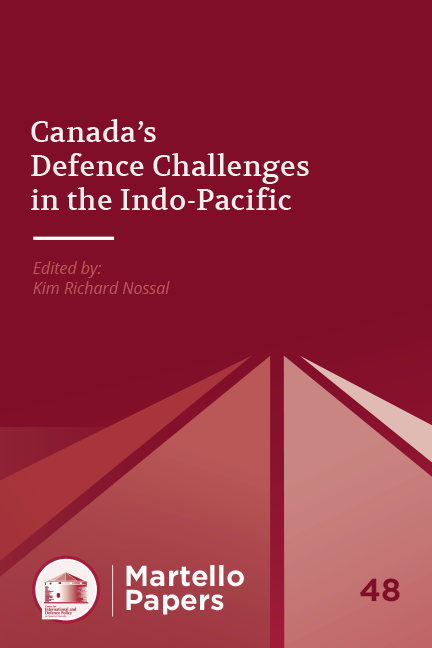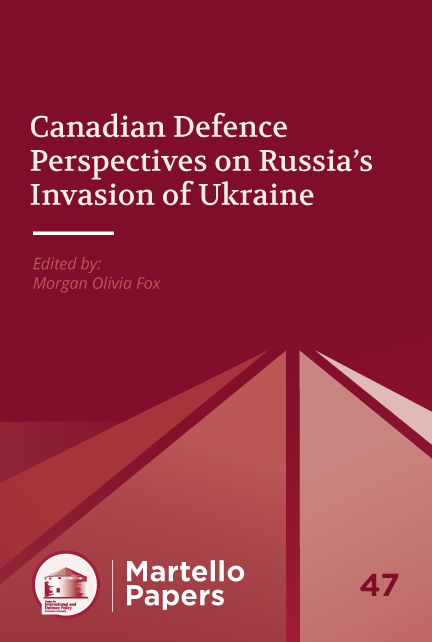The Martello Papers are a monograph series of security studies. Taking their name from the distinctive towers built during the nineteenth century to defend Kingston, the Martello Papers cover a wide range of topics and issues relevant to contemporary international strategic relations.
*to inquire about procuring a physical copy of our publications please contact the CIDP at cidp@queensu.ca. Please note that stock is limited and subject to availability.

Recent Editions

Edited by: Ian Parenteau Ph.D
The Impact of Contemporary Tensions, Conflicts and War on Regional and International Security: Subtitle: Case Studies
Series 49 | Published Feb. 2025 | 69 pp
These papers were presented at the International Forum on Peace, Security and Prosperity (IFPSP) held in Palermo, Sicily, March 2024. The theme of the event was ‘The Impact of Contemporary Tensions, Conflicts and War on Large International Institutions.’ This event brings university and military academy students from all over the world, as well as professors and researchers with an interest in the broad topic of peace, security and prosperity. The 2024 edition drew more than 350 participants from five continents. At a time when the global security situation has been deteriorating for several years and geopolitical tensions are generating very real fractures in the post-war liberal order, the forum is an opportunity for participants to examine together these issues. In addition, the forum gives participants a chance to identify the main causes of contemporary conflicts as well as the methods of prevention and containment from the perspective of positive peace.

Edited by: Kim Richard Nossal
Canada’s Defence Challenges in the Indo-Pacific
Series 48 | Published Oct. 2024 | 69 pp
In the fall of 2022, the Canadian government announced a new approach to the Indo-Pacific region. Canada’s Indo-Pacific Strategy (IPS) asserted that there were tectonic changes in global politics underway—a “once-in-a-generation global shift that requires a generational Canadian response.” But what kind of change in Canadian defence policy was the IPS calling for? Would it involve restructuring the Canadian Armed Forces to meet the demands of the new geostrategic environment? If so, what would the budgetary implications of such a “generational response” be? To examine the defence policy implications of the IPS, the Centre for International and Defence Policy at Queen’s University and the Canadian Defence and Security Network headquartered at Carleton University co-hosted a workshop in January 2024. To guide and galvanize discussion at the workshop, ten experts in Canadian foreign and defence policy were invited to contribute brief reflections on the implications of the IPS for Canadian defence policy. Their briefs, reproduced in this Martello Paper, provide a useful set of policy perspectives for thinking about Canadian defence policy in the years ahead as Canadians are increasingly drawn into great power rivalries in the Indo-Pacific.

Edited by: Morgan Olivia Fox
Canadian Defence Perspectives on Russia's Invasion of Ukraine
Series 47 | Published Sept. 2024 | 54 pp
In Canadian Defence Perspectives on Russia’s Invasion of Ukraine, an anthology edited by Morgan-Olivia Fox, undergraduate and master’s level students explore the complexities of Canadian foreign policy amid Russia's ongoing invasion of Ukraine. This Martello Paper examines Canada’s response to Russia’s aggression, emphasizing its involvement in international organizations, its commitment to the Women, Peace, and Security (WPS) and Youth, Peace, and Security (YPS) agendas, and the broader context of great power competition. Through a series of insightful essays, the contributors analyze the challenges Canada faces, from international law and security in the Arctic to the gendered aspects of Russia's invasion. This volume is not only a testament to the academic rigor of its young contributors but also a vital resource for understanding Canada’s strategic position in an increasingly volatile world.
.png)
Edited by: Howard G. Coombs, Magali Deleuze, Kevin Brushett and Marie-Michèle Doucet
Peacekeeping: Perspectives Old and New
Series 46 | Published Apr. 2023 | 211 pp
2017 represented the 60th anniversary of the awarding of the Nobel Peace Prize to Lester B. Pearson, then Canada’s Secretary of External Affairs and later Prime Minister, for his crucial role in organizing the United Nations Emergency Force (UNEF) to help resolve the Suez Canal Crisis of 1956. Pearson’s role in deploying peacekeepers to resolve the conflict was not only a crucial turning point in the institutionalization of United Nations (UN) peacekeeping, but it also began the long and proud history of the Canadian Armed Forces (CAF) of providing support to peace operations ever since. Equally important was the electoral promises of Justin Trudeau’s Liberal government to recommit Canada to a UN peacekeeping role after a decline in support during the governments of Stephen Harper and Paul Martin. For many Canadians, Trudeau’s aspirational catch phrase “We’re back!” led to a belief that their armed forces would reassume their traditional “Blue Helmet” roles in UN operations, including the deployment of Canadian soldiers to conflict regions. Indeed, Canada’s “return to peacekeeping” came at a time when many were beginning to reflect on peacekeeping’s future both in Canada and beyond, including the newly elected UN Secretary-General Antonio Guterres who worried that the UN was “underperforming in conflict prevention, in peace operations, and in efforts to sustain peace.”
.png)
by: Sean M. Maloney
Strategic Nuclear Force Signalling During the Russia-Ukraine Crisis: A Preliminary Analysis
Series 45 | Published Feb. 2023 | 94 pp
Signalling using strategic nuclear forces was thought to be an artifact of the Cold War. This Martello paper demonstrates that this is not so. Indeed, new forms of of information, especially social media, has altered and now merged with nuclear force signalling.
Weeks before the latest iteration of the Russian invasion of Ukraine in February 2022, American, British, and French strategic nuclear forces were employed to backstop and underpin diplomatic and other efforts in an attempt to forestall escalation. Russian attempts to use strategic nuclear forces to generate docile compliance by the West failed in the face of these efforts. This preliminary analysis looks at this activity in the first half of 2022 during the initial stages of this phase of the Russo-Ukrainian war.
.png)
by: Linna Tam-Seto, Ph.D., O.T.Reg.(Ont.)
Framework for Women Mentorship in the Canadian Armed Forces (FWM-CAF)
Series 44 | Published Jan. 2023 | 123 pp
This study explores the possibility of a mentorship program for women in the Canadian Armed Forces (CAF). Through a six-phase study including a scoping review, interviews, resource mining and review, framework development, resource development, and validation, the Framework for Women Mentorship in the CAF (FWM-CAF) was created. This Martello paper lays out the creation of the framework using the interview data from 28 initial interviewees (mostly women) and eight additional validation interviewees (an equal number of men and women). After an extensive scoping review of the literature on mentorship in military, military adjacent and policing organizations, interviews were held with subject matter experts in mentorship as well as Canadian service-women and Veterans who had served or are serving as mentors and mentees. The interview data revealed overall support for the idea of program specifically for women in the CAF, as interviewees expressed their positive experiences with the network and community-building that mentorship can provide, especially in male-dominated organizations such as the military.
Previous Editions
| Series | Title | Author/Editor | Year | Download |
|---|---|---|---|---|
|
43 |
Canada’s Feminist Foreign Policy And Women, Peace and Security Norms |
Charlotte F. Blatt |
2020 |
PDF [1.4 mb] |
|
42 |
Understanding the Impact of Surveillance and Security Measures on Muslim Men in Canada Comprende l'impact des mesures de surveillance et de sécurité sur les hommes musulmans au Canada |
Taasum Akseer |
2019 |
English PDF [1.1 mb] French PDF [1.2 mb] |
|
41 |
Bilateral Agendas: Canadian Foreign Policy on the Ground |
Louis A. Delvoie |
2018 |
PDF [760 kb] |
|
40 |
Perspectives on the Politics of Borders and Belonging |
Marin Beck, Bailey Gerrits, Alexandra Leibich, Rebecca Wallace |
2017 | PDF [695 kb] |
|
39 |
"Til Death Do Us Part"? Sanctuary of Ideas, Committed Actors, and Lifetime Rulership in Côte d'Ivoire, Gabon and Togo |
W.R. Nadège Compaoré |
2015 | PDF [500kb] |
|
38 |
Canada and the Netherlands in Afghanistan |
Joseph T. Jockel | 2014 | PDF [711 kb] |
|
37 |
Evolving Transnational Threats and Border Security: A New Research Agenda Évolution des menaces transnationales et sécurité frontalière : un nouveau programme de recherche |
eds. Christian Leuprecht, Todd Hataley, Kim Richard Nossal | 2012 | English PDF [1.3 mb] French PDF [1.5 mb] |
|
36 |
Canada and the Kosovo Crisis: An Agenda for Intervention |
Michael W. Manulak |
2011 | PDF [598 kb] |
| Series | Title | Author/Editor | Year | Download |
|---|---|---|---|---|
|
35 |
DARFUR: Reflections on the Crisis and the Responses |
J. Andrew Grant |
2009 | PDF [1.2 mb] |
|
34 |
Reviving Realism in the Canadian Defence Debate |
Philippe Lagassé and Paul Robinson |
2008 | PDF [643 kb] |
|
33 |
EUFOR RD Congo: A Misunderstood Operation? |
Lieutenant-Colonel Helmut Fritsch | 2008 | PDF [373 kb] |
|
32 |
Untangling NATO Transformation |
Stephen J. Mariano |
2007 | PDF [255 kb] |
|
31 |
NATO Enlargement and the Politics of Identity |
Daniel Braun |
2007 | PDF [352 kb] |
|
30 |
ESDP and German Contributions: Back on Earth? |
Lieutenant-Colonel Helmut Fritsch | 2006 | PDF [301 kb] |
|
29 |
Unfair Play: Cyprus, Turkey, Greece, the UK and the EU |
Costas Melakopides |
2006 | PDF [386 kb] |
|
28 |
North American Security: America's Response, Canada's Role |
LCol Jeffrey Turner, LCol Bruce Johnson, LCol David Miller |
2005 | PDF [802 kb] |
|
27 |
The Roots of Soft Power: The Trudeau Government, De-NATOization and Denuclearization |
Sean M. Maloney |
2005 | PDF [635 kb] |
|
26 |
Toward a Regional Approach to Human Security in Southern Africa |
Alhaji M.S. Bah |
2004 | PDF [247 kb] |
|
25 |
The Transatlantic Link in Evolution: What has Changed Since 11 September 2001? |
Charles C. Pentland |
2003 | PDF [222 kb] |
|
24 |
War with Iraq: Canada's Strategy in the Persian Gulf |
Sean M. Maloney | 2002 | PDF [318 kb] |
| Series | Title | Author/Editor | Year | Download |
|---|---|---|---|---|
|
23 |
What NATO for Canada? |
David G. Haglund | 2000 | PDF [317 kb] |
|
22 |
Is France Still a Great Power? |
Pascal Boniface | 2000 | PDF [222 kb] |
|
21 |
Canada, the US and Cuba: Helms-Burton and Its Aftermath |
Heather N. Nicol | 1999 | PDF [373 kb] |
|
20 |
The United Nations and Mandate Enforcement: Congo Somalia and Bosnia |
Jane Boulden | 1999 | PDF [336 kb] |
|
19 |
Canada and the Future of Collective Defence |
David L. Bashow | 1998 | PDF [213 kb] |
|
18 |
From Ottawa to Sarajevo: Canadian Peacekeepers in the Balkans |
Dawn M. Hewitt | 1998 | PDF [434 kb] |
|
17 |
The Americanization of Peacekeeping: Implications for Canada |
Joel J. Sokolsky | 1997 | PDF [176 kb] |
|
16 |
Informing the Blue Helmets: The United States, UN Peace Operations, and the Role of Intelligence |
Robert E. Rehbein | 1996 | PDF [338 kb] |